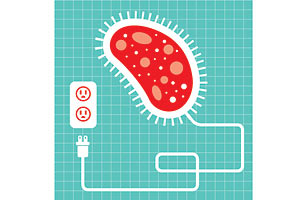
Bacteria have always gotten a bad rap. But we should be thankful for one especially talented microbe, Geobacter, which has tiny hairlike extensions called pili that it uses to generate electricity from mud and wastewater. Professor Derek Lovley and his team of researchers at the University of Massachusetts at Amherst have engineered a strain of Geobacter that's eight times as efficient as other strains at producing power. The next step: creating Geobacter-based fuel cells that can generate cheap, clean electricity.